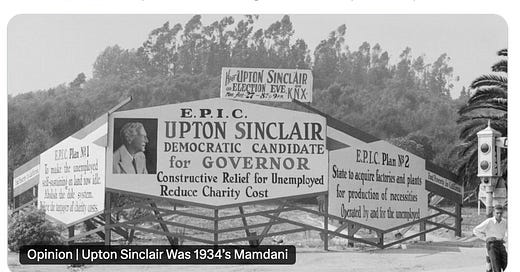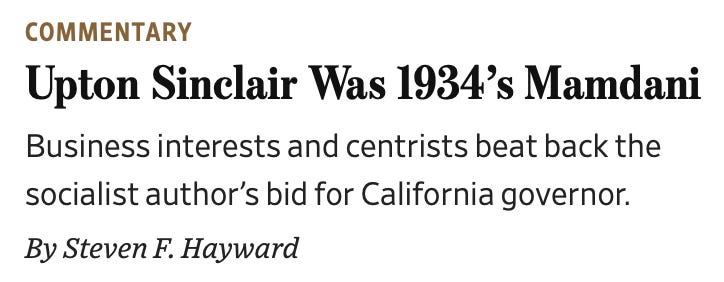• If you have a Wall Street Journal subscription, you can take in my article this morning noting the parallels between Zohran Mamdani and Upton Sinclair, the socialist candidate who won the Democratic Primary for governor of California in 1934.
If you don’t have a Journal subscription, not to worry. I’ll be back here in a few days with a longer version of the story, with more fun details. For a newspaper I had to limit it to about 1,000 words.
Guess what? Lefties don’t like my article!
Sometimes lefties really do make life too easy:
By the way, in case you’re curious: No, Sinclair did not win the 1934 Dem nomination in a jungle primary. Sorry—couldn’t help it. . .
(And yes, in case you’re also wondering: I wrote this article partly to annoy “Lucretia,” who is a certified hater of my historical parallels as podcast listeners know.)
• Anyone remember when liberals boasted back in the GW Bush years that they belonged to something called the “reality-based community”? Bueller? Anyone?
Get a load of this from a report in The Telegraph (behind a paywall, alas):
According to a growing number of spiritually-inclined Democrat supporters, 4am on Nov 6 2024 is the moment the universe “split”, leaving us on an alternate timeline where Mr Trump is president.
In reality, they claim, Ms Harris was installed in the White House, and it is only a matter of time before we all collectively realise our mistake and jump back to the “correct” timeline. . .
Psephologists may cast doubt, but for thousands of self-described witches and mystics on TikTok, the evidence is incontrovertible.
Known as the 4am Club, the movement is founded by Gia Prism, a self-styled psychic medium and healer, and has been described as the “Left’s QAnon”.
Videos of “4am clubbers” on social media have garnered hundreds of thousands of views, featuring mostly young women describing their uncannily similar experiences on election night.
Around the time the clock struck 4am, people across America claim to have woken up with a sinking feeling that Mr Trump would win the presidency.
“It wasn’t just a feeling, we had a shared mystical experience that night,” said Ms Prysm in one of her videos. “We had the same dreams, we had the same visions, we heard the same songs, we heard the voices of our deceased loved ones.”
Now I know what you’re thinking. “This is another Karl Rove operation, isn’t it?”
• This wins Twitter today, hands down:
• Finally, the latest episode of the 3WHH podcast that mysteriously went AWOL over the weekend has been restored and is finally up at Ricochet.









Quick name three of the best propagandists in the 20th Century.
1. Joseph Goebbels
2. Upton Sinclair
3. Ida Tarbell
Next to the poorly researched and inaccurate vendetta book, The History of the Standard Oil Company by Ida Tarbell, The Jungle by Upton Sinclair is one of America’s best one-sided fictional classics with a remote relationship to the truth. Only Joseph Goebbels surpassed Upton Sinclair - who deserved to live in Ukraine in the 1930’s so he could see and live Socialism up close. Feel the malaise.
Were there accidents, abuses, and brutal competition in the early oil and meatpacking industries? I don’t know, ask IBM, Commodore International, Atari, Inc., Sinclair Research / Timex Sinclair, Osborne, Atari, and Compaq, which all got knocked about and pushed out of the desk top PC business in what also was a brutal competition that harmed a great many people. I left out the names of so many PC businesses who got slaughtered before they left the garage — it was a murderous Halt and Catch Fire. And that is what was happening to two massively changing industries at the turn of the 20th Century, meat packing and oil (the same can be said for the anti-semitism business which had been well underway for centuries and would soon enough have a revival that propelled Goebbels).
You see, innovation or start-ups are not bean ball. Innovation can be a nasty business, which is why it is often referred to as “creative destruction” — GBU-57 type destruction. And Ida Tarbell’s daddy got beat up financially trying to beat up other start-ups in the oil business. So she had an axe to grind with the perfect looking villain, John D. Rockefeller, who under cut Franklin Tarbell among others and left him rotting along the road to success. How does a father explain to his daughter he screwed up? Why the other guy cheated him, of course.
The meat packing business was also consolidating and building efficiency, and if you have ever walked through a meat slaughtering house today, … then you know back in 1900 they operated like industrial scale butcher shops with poor conditions, but the same conditions that existed in most butcher shops around the country. The big winners were Armour, Swift, Cudahy, and Morris packing companies who bought or built large multi-story factories that fed the nation beef, and these four controlled most of the industry in Chicago, Omaha, and Kansas City.
Slaughter and butchery is not a business conducted at “The Club” — and health standards were evolving as meat is a living, then dead, and then perishable item that is badly in need of cleanliness, sanitation, and near immediate consumption if not cooked and canned. Meat packers were aware that you cannot poison your customers for long and there was a need to keep your workers working with as many arms, legs, and fingers as possible (they were not heartless or careless, but they accepted the danger). However, there were conditions inside these assembly line meat packers that were truly disgusting — if they were not typical of the day. If you were a fly on the wall, you would be eating well.
You see the meat packing business conjures up a revolting reaction in most people since it is a bloody, messy process. Seeing the offal alone in a modern, super cooled packing plant will make you puke. Today, they strap the legs of the animal at the front of an assembly line, hit it with an air gun or solenoid in the center of the skull just over the nose to kill or numb it, and then raise the soon to be carcass in the air by its rear legs and push it forward on a overhead moving conveyor chain. They then literally gut the carcass, drain its blood, and out fall its heart and lungs (still moving) along with the intestines and other entrails onto a conveyor belt to be slice and diced. Yum. Yum. The meat comes off after they skin the carcass. Just walking through a modern plant will leave a smell on you and in your clothes that is somewhere between baby vomit and a rotting corpse after sitting in the hot sun for 3 days in the Vietnamese jungle. You won’t eat meat for a week afterward. Better to think meat comes from plastic packages in a cooler at the store. Imagine the smell and mess in an open air plant on a hot day in 1900 in Kansas City. Prime rib anyone?
Sinclair was an opportunist who sold the American public on his fantasy of how business was poisoning them and feeding them the carelessly removed fingers of its employees who worked 33 hours a day. Yes, the world was wicked and the butchering process full of problems. But humanity’s fondness for meat protein had always been a brutal process along with just about every other bodily need or function until the rise of evil capitalism which both enriched and empowered men, as well as gave them better health, sanitation, water, food, housing, clothing, warmth, and leisure time, including those unlucky enough to work in the meat packing houses. Evil capitalism also gave rise to men like Sinclair who had the time to educate himself and naively think they had a better solution, Socialism. These could write indignant books about disgusting subjects so ladies could read them in their parlors by the light of their safer, Standard Oil lamps.
Oh by the way, from the rise of Standard Oil until its demise, the price of home lighting oil dropped every year in real and actual terms. Afterword, the price of home lighting oil, which John D. Rockefeller branded “Standard Oil” because it was safer due to Rockefeller’s fanaticism to standardized it and make it consistent and safer from explosion in the home, rose every year for decades until America was electrified. And as for the monopoly Rockefeller had, he actually had to reduce his costs and price to eliminate competition from whale oil, lower quality manufacturers whose product was dangerous, little producers who had no idea what they were doing and were underselling him and losing money (I’m look at you Franklin Tarbell), and foreign competitors who wanted to dump lighting oil made from petroleum on the American market and take it over.
Rockefeller understood marketing and distribution. He negotiated a better deal for rail transport because he was a large volume shipper and the local branch railroads, along with the NYCentral and Pennsylvania RR, were robbing him blind. Other smaller producers got steam rolled. Rockefeller was prepared to build his own branch rail road lines if necessary.
Was he corrupt — probably, but not entirely. He was driven. And the result was consumers were safer and lived better with standard oil lighting, and later gasoline for their horseless carriages, … until the Sherman Anti-Trust Act and Edison’s light bulbs came along. Rockefeller mastered refining of non-explosive lighting oil and different forms of kerosene, gasoline, waxes, and other by products. And when Spindle Top in Texas boomed, he bought in by buying Humble Oil and Refining in Humble, Texas near Houston. He was on his toes. And he was RICH. The envy of the envious who wanted revenge and a target for populists.
And naturally, Upton Sinclair saw in the owners of the packing houses people like Rockefeller, wealthy and living exorbitant lives while others labored long days as butchers in an industrial butchery. He did not go after the local butchers with some of the same practices, they were petty bourgeois. He went after the rich who built more efficient, lower cost operations, able to feed millions and make beef more affordable and preserved on the shelves as they were struggling to find safer, healthier means of production — there, I used “means of production”. I’m a socialist.
Look out Elon.
I couldn’t get through that article on the 4am nut jobs. I’d believe in space aliens before those nuts.